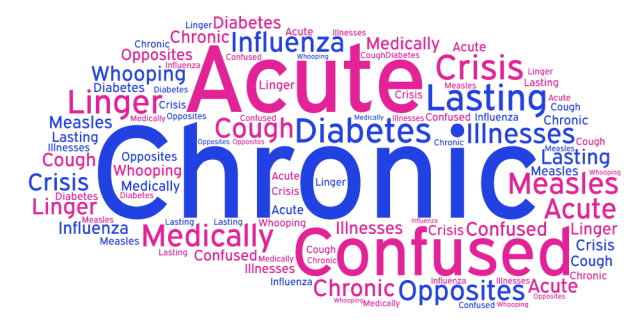
Do you sometimes struggle to find the ‘right’ word for your writing? I know I do. Maybe, in helping myself, I can help other writers.
Today’s words: Chronic/Acute, Completely Annihilate, Synaesthesia
Words often misused: Chronic is often confused with ‘acute’, but, medically, they’re opposites. Chronic means long-lasting and includes such conditions as Type 1 diabetes, ME/CFS, MS and many others that linger. Acute illnesses, on the other hand, reach a crisis, and include such conditions as influenza, measles and whooping cough.
Redundancies: words serving no purpose. In speech, they’re spacers, giving the speaker time to think. But in writing they slow the reader’s progress.
Completely annihilate: To annihilate something is to utterly destroy it, therefore ‘completely’ is unnecessary here. You can safely annihilate ‘completely’ from this phrase and leave it meaning the same.
Figure of Speech:
Synaesthesia: A figure in which a metaphor, simile or other word uses terms associated with one sense to describe another. It allows physical senses to perceive the abstract.
‘Susan picked up the apple, its green smell attracting her love of crispness.’
‘Cool waves splashed Jenny’s feet touching them with freedom.’
‘Tones of white tinkled like small silver bells.’
I started the series on figures of speech in the earlier posts, which you can search for under ‘Looking for the Best Word?’ if this interests you. In these newer posts, I’ll continue to the end of the alphabetical list I started with.
Language learners might find this link useful for pronunciation, and you’ll reach a great group page on Facebook if you click this link.
I contribute a monthly column to an online magazine, Pandora’s Box Gazette where I also deal with the use of words. To see the most recent, please click this link.
Your observations and suggestions are welcome in the comments section below. And, if you’ve enjoyed this post, why not use the buttons to share it with your friends? Thank you.



Completely annihilate. Would that be like “almost dead”?
LikeLiked by 2 people
An interesting one, Roger.
To annihilate is to completely destroy, so ‘completely’ is a tautology, an unnecessary qualification of an absolute. ‘Dead’ is, perhaps, another matter. I think we all understand the idea of ‘almost dead’, in the same way as ‘he nearly killed me!’ Although death is the end, the finish, a termination, we all understand that there are situations in which a near escape can be described as ‘a near death experience’, so I think ‘almost dead’ would generally be acceptable, through usage if not otherwise.
Of course, being dead is an absolute state, so, strictly speaking, ‘almost dead’ is grammatically questionable. But we all know that language rules are subject to interpretation and generally flexible enough to allow some wriggle room! Perhaps, ‘near to death’ or ‘close to death’ might be a better way to express this.
I hope that helps.
LikeLike
Very helpful post.
‘Susan picked up the apple, its green smell attracting her love of crispness.’
Is green smell correct? I’ve never read it described as so.
LikeLiked by 2 people
That’s synaesthesia; using words that generally describe one sense (in this case, sight) to describe another (taste). It’s a type of metaphor. Hope that helps.
LikeLiked by 2 people